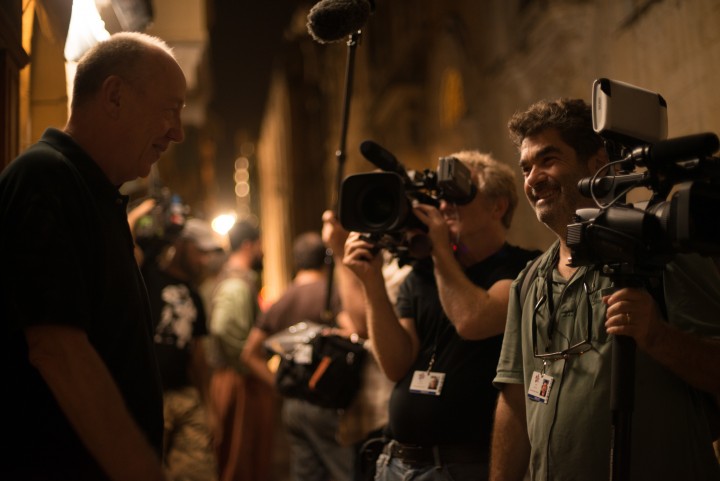
(Photo courtesy of José Haro)
Last week, I was honored to introduce Oscar-winner Terry George’s Armenian Genocide-era drama, “The Promise,” as part of the Smithsonian Folklife Festival “Armenia: Creating Home” program’s Cultures of Survival series. Just a few hours ago, I had the chance to do the same, before a capacity crowd, for “Intent to Destroy,” Oscar-nominee Joe Berlinger’s remarkable documentary detailing the facts behind the Armenian Genocide, the depths of the denial, and a window into the making of “The Promise,” starring Oscar-winner Christian Bale.
There’s a story behind these screenings, one of quiet persistence, inspiring courage, and concrete progress.
It started about five years ago.
In Oct. 2013, the Washington Post’s Pulitzer Prize-winning reporter Philip Kennicott broke the news about the White House pulling the plug on a planned Dec. 16 Smithsonian Institution display of the Armenian Orphan Rug, fearful of Turkish government retaliation against an official U.S. exhibition of this artifact simply because it was woven by child survivors of the Armenian Genocide.
This beautiful, one-of-a-kind, hand-crafted rug had been gifted to President Calvin Coolidge in appreciation of U.S. relief efforts, but was kept from the American people as a result of direct foreign pressure—a shocking example of Turkey’s gag-rule being enforced down to the level of the types of art that our nation’s cultural institutions are allowed to display, even at the cost of downgrading a proud chapter in American history.
It took bipartisan Congressional protest, coverage by the Washington Post, NPR, the Los Angeles Times and other media outlets, a sustained nationwide Armenian National Committee of Ameirca (ANCA) grassroots campaign, and the intervention of the National Security Council to finally get the rug released the following year for a brief display in the White House Visitors Center, without—very notably—any meaningful historical context or a single mention of the Armenian Genocide.
Fast forward to this summer.
To the 2018 Folklife Festival—the Smithsonian’s signature national event, drawing millions of on-site and online visitors.
The Festival, this year, is hosting a remarkable Cultures of Survival series of narrative sessions and film screenings as part of its landmark “Armenia: Creating Home” program. These sessions underscore the central role of culture—in all its forms, from food and crafts to music and dance—in helping people survive and thrive through and beyond genocide, war crimes, and other violence, moving from displacement to resilience. Interactive sessions include “Armenians in America,” “Making Meaning: Economic and Healing Power of Craft,” “Giving Voice: Language and Cultural Survival,” “Sounding Memory: Music & Migration,” and “Tastes of Home: Food Enterprises.” The film screenings of “The Promise” and its companion documentary “Intent to Destroy”—very appropriately—speak powerfully to the culturally inspired resilience and rebirth of Armenians and other survivors of genocide, war crimes, mass violence, and forced displacement.
The screening at America’s premier national festival of these two major films—produced through the generosity of the late Kirk Kerkorian and the leadership of Eric Esrailian—represents a high-profile challenge to Turkey’s denials and a powerful blow against those in the U.S. government who, despite past American recognition of this crime, remain actively complicit in Ankara’s obstruction of justice for the Armenian Genocide.
To the Smithsonian’s great credit, each film is cited with clear reference to the Armenian Genocide.
No bans. No gag-rules. No word games, evasive language, or euphemisms.
No cultural or artistic censorship.
Just the truth.
It took five years, lots of work, and many brave allies.
But, together, we defended historic memory against the forces of denial—ensuring that the lessons of the past are understood and applied in seeking to prevent new atrocities.
We are, step by step, federalizing Armenian Genocide remembrance.
Against the full force of the Turkish government – building upon past recognition—we are working to ensure that the Armenian Genocide is forever condemned and appropriately commemorated across our nation’s government and civil society. We are integrating the lessons of this crime into U.S. foreign policy and educating America’s school children about its history—aggressively and relentlessly marginalizing those who, either bullied or bribed by Ankara, would dare enforce a foreign gag-rule here on American soil.
Today’s the happy ending to a long story, thanks to the inspiring courage of the Smithsonian’s leadership and our collective commitment to #KeepThePromise.
***
The full schedule of Cultures of Survival programming is available here.


Be the first to comment